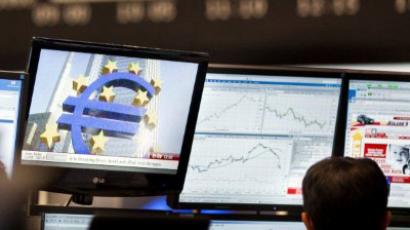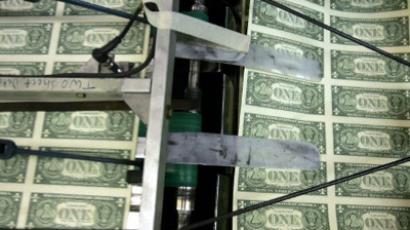S&P adds to eurozone woes, downgrading France and 8 others
A total of nine countries have had their S&P ratings downgraded.European leaders have been quick to criticize credit ratings agencies for having a negative impact on the 17-nation monetary union at the very time it is attempting to avert a crisis.
European Commission Vice President Olli Rehn said he “regrets” S&P’s decision, which he deemed “inconsistent.” He said the euro area has taken “decisive action in all fronts of its crisis response” to push reforms and strengthen banks.Eurogroup President Jean-Claude Juncker stressed that governments that use the euro have already taken far-reaching measures to ease tensions in the debt markets. He said eurozone countries are determined to do “whatever it takes” to recover from the debt crisis and return to growth.Standard & Poor’s rating agency has downgraded sterling AAA credit rating of Europe's second-largest economy, France. Austria, Malta, Slovakia and Slovenia have also seen their rating cut one notch, while Cyprus, Italy, Spain and Portugal have dropped two positions. Austria had also previously held a top AAA rating. Earlier on Friday the rumors of a downgrade had already sent markets plunging.The US-based rating agency justified its decision pointing to a combination of economic and financial factors along with “insufficient” measures taken by European leaders in dealing with the crisis."Today's rating actions are primarily driven by our assessment that the policy initiatives that have been taken by European policymakers in recent weeks may be insufficient to fully address ongoing systemic stresses in the eurozone," said S&P. It also warned that austerity alone will not fix Europe’s financial woes. French finance minister François Baroin has earlier spoken to France-2 television confirming the reports of the one notch downgrade. "It's not good news, but it's not a catastrophe," he said. "It's not ratings agencies that decide French policy."France and Austria now have rating of AA+, the same as the United States has had since it was downgraded last August.France though still has a top AAA rating from the other major rating agencies, Moody’s and Fitch.Following the downgrade Italian bonds fell from A to BBB+, which is S&P's lowest so-called investment grade category. Spain fell to A from AA-. Germany, Finland, the Netherlands and Luxembourg all managed to maintain their perfect AAA ratings.
Political economist Jerome Roos told RT that the downgrade is just a subjective opinion by a powerful private institution and should be taken with “a grain of salt.” He warned that we should be really worried about the leverage and the power these subjective opinions ultimately have on the crisis and the ways of getting out of it.“The power of these rating agencies dictates the discourse, the debate here in Europe. It allows them, to a certain extent, to dictate almost self-fulfilling prophecies. Ultimately, the downgrade is justified by the results of the impact of the downgrade itself.”
However, Patrick Young, executive director of the investment firm DV Advisors, told RT that in France’s case, the downgrade is long overdue.“This [downgrade] has been deserved for several years. The French government has been economically incontinent for the course of several decades. They have no concept of how to run a reasonable economy in terms of not spending more money than they can afford.”Young also says that the S&P downgrade is likely to decouple France from what could become the last remaining economic power in Europe.“The issue emotively of this downgrade is that it fundamentally alters the balance of power within Europe, because France is now, a very, very second-grade member of the top pairing in the European Union, and that leaves everything up for [grabs] in the EU at the moment. It also leaves Germany hideously exposed – and domestic politics in Germany are about to get very bloody for Mrs. Merkel,” he said.“Now everyone across the border from France in Germany is going to be looking down on their neighbors and asking, ‘Why should we, Germany, end up being alone amongst the very elite club of nations that have got their AAA, the top-grade rating, and indeed, our French partner is no longer the perfect bride,’” Young continued.Also, with the French presidential election planned for April 22, Young argues the French electorate will most likely voice their discontent for Nicolas Sarkozy.“I actually think that Mr. Sarkozy will be lucky to make it into the second-round run-off of the presidential elections…I think France has just had enough of him. He’s hyperactive, but delivers nothing. Ultimately, he will be the man who was there when France was downgraded as a major league economic power to being a second-tier nation financially.”
Putting a brave face on a sorry business
On Saturday Germany and France, Europe`s two largest economies and policy-setters for the entire eurozone, have given their official reaction to Friday`s downgrades.French Prime Minister Francois Fillon has defended his government's economic policies, saying that the S&P decision is just an alert that should not be dramatized. "This decision was expected, even if one could find it came at the wrong time, given the efforts made by the eurozone, which investors are starting to see," he told the news conference. He also said that it was not government policies that were under attack from the ratings agency, and those economic policies would be maintained to cut spending and bring the annual budget back into surplus by 2016.German Chancellor Angela Merkel also did not seem surprised by the news. "The decision confirms my conviction that we in Europe still have a long road ahead of us before the confidence of investors is restored," she said at a televised news conference.The chancellor urged eurozone members to implement a planned pact to strengthen budget discipline “as soon as possible,” and stressed the importance of a new treaty enshrining tougher fiscal rules.In early December, most European Union leaders agreed to draw up the pact, which Merkel says may be signed as early as the end of this month, and at the beginning of March at the latest.














